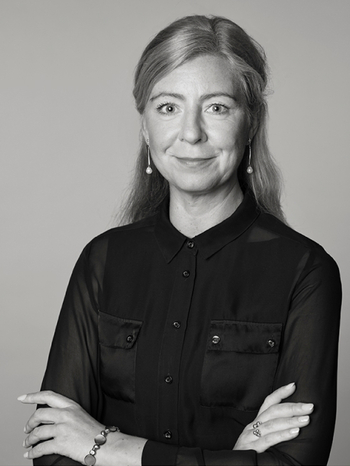Carl Milles
Triton carrying seashells
A fountain sculpture. Signed Carl Milles. Foundry mark Herman Bergman Fud. Numbered, No 1 and dated 1950. Original version executed 1924-26. Study for the Halmstad fountain. Bronze, green patina. Height 75.5 (29.5 in) cm (including base 195.5 cm (77 in)).
More information
Carl Milles, probably the most outstanding Swedish sculptor of the 20th century, was a dreamer as a child and had no interest in academic studies but was deeply moved by art, literature and nature. At the age of sixteen he learnt woodcarving and studied for some time at the Technical College in Stockholm. A grant made it possible for him to go to Paris in 1897, where he spent seven years studying and working. Here he met Rodin, who became a friend, and was his most important source of inspiration. He also met his future wife, Olga Granner, a portrait painter from Austria.
In 1907 Carl and Olga settled down on the island of Lidingo near Stockholm at, Millesgården, their beautiful home, which is today a museum and open-air exhibition space for Milles’ sculptural works.
In the 1920s the couple made many trips around Sweden and abroad. Milles had become very sought after and secured many important commissions. He is responsible for a great number of monumental works throughout Sweden, and greatly influenced a generation of young artists whom he taught as a professor at the Art College in Stockholm.
Milles international breakthrough came in 1927 after an exhibition of his works at the Tate Gallery in London, followed by exhibitions in several German cities in 1928.
By 1931 Carl and Olga had settled in the USA, where Milles obtained a professorship at Cranbrook Academy of Art in Bloomfield Hills, near Detroit. The couple remained there for the next twenty years, during which time Milles produced such important works as the fountains The Meeting of Rivers in Saint Louis and The Resurrection in Washington D.C.
The two elements, Water and Air, were constant fascinations to Milles. In his fountains he created his own seas where the sculptures reach upwards into eternity. The mythological sea God Triton, who was the son of Neptune and half man and half a sea creature, inspired to several fountains. Here the refined Triton is gracefully twisting upwards into the skies and when water is trickling down from the seashells it caresses the Triton’s body making the green patinated bronze shimmer in the light.
Artist
Carl Milles was a Swedish sculptor born in Lägga. He studied at the Technical School in Stockholm, at the Ecole des Beaux-Arts in Paris under Auguste Rodin and on study trips to Germany, the Netherlands and Belgium. In Paris he came to stay for many years and made a living as an ornament carver. He studied the animals in the Jardin des Plantes (the Zoological Garden) and was strongly influenced by Auguste Rodin. Milles made a breakthrough with a monument to Sten Sture in Uppsala. He exhibited at the World's Fair in 1900 and was later given a solo exhibition at the Tate Gallery in London. Milles was professor of modeling at the Royal Academy of Arts in Stockholm. Well-known sculptures in public places signed by Carl Milles are the "Gustav Vasa" statue at the Nordic Museum, "Orfeusgruppen" outside the concert hall in Stockholm and the "Poseidonfontänen" in Gothenburg.
Read more








































